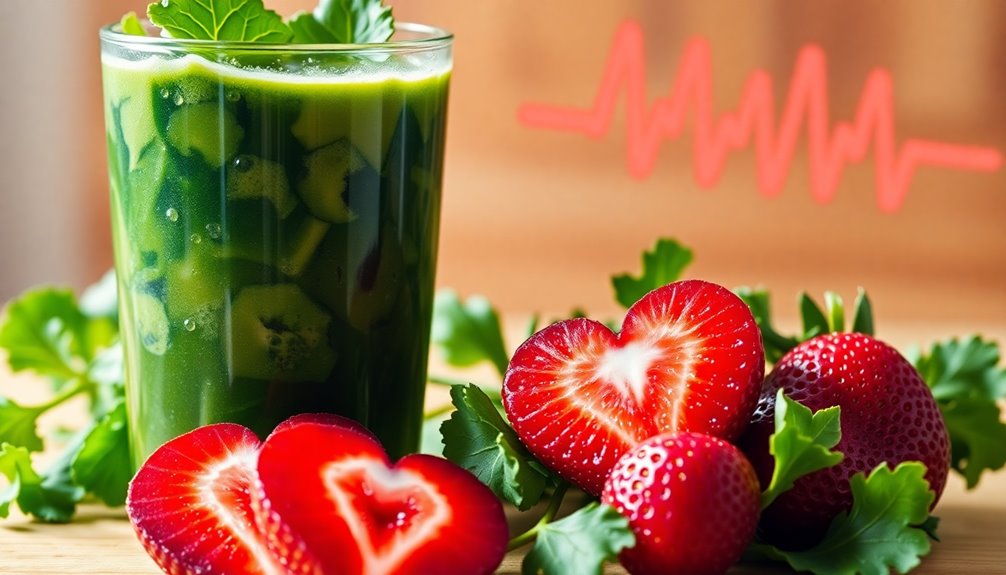Juicing can definitely boost your heart health! Fresh juices from beets, pomegranates, and leafy greens lower blood pressure and improve circulation. They're packed with antioxidants that protect your blood vessels and fight inflammation. Adding citrus fruits offers flavonoids that further reduce heart disease risk. Plus, incorporating smoothies can enhance your nutrient intake while keeping sugar levels in check. If you want to discover more ways to enhance your heart wellness, there's plenty to explore!
Key Takeaways
- Juicing with ingredients like beetroot and leafy greens can lower blood pressure and improve overall cardiovascular health.
- Antioxidant-rich juices, such as pomegranate and citrus, combat oxidative stress and inflammation, reducing heart disease risk.
- Tomato juice provides essential nutrients and antioxidants, strengthening arteries and lowering cholesterol levels for better heart health.
- Regularly consuming vegetable juices increases nutrient intake while keeping sugar content lower than pure fruit juices.
- Staying hydrated with juices and water supports circulation and reduces strain on the cardiovascular system.
Understanding the Benefits of Juicing for Heart Health
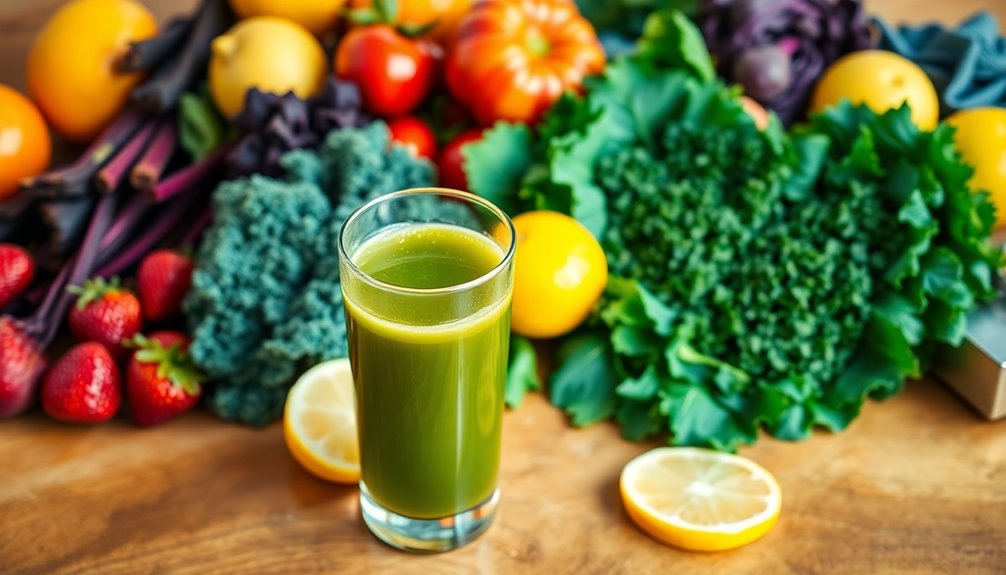
Juicing can be a game changer for your heart health, especially when you incorporate ingredients like beetroot and leafy greens.
These powerful ingredients are packed with nitrates, which can greatly lower your blood pressure by promoting vasodilation and improving blood flow within just an hour of consumption.
Leafy greens like spinach and kale offer additional health benefits, as they're rich in fiber and carotenoids that help eliminate harmful compounds, supporting your cardiovascular system.
Adding citrus fruits like oranges and lemons boosts your juice with flavonoids that neutralize free radicals and reduce the risk of heart disease.
Regularly consuming these heart-healthy juices enhances your nutrient intake, ensuring you meet your daily fruit and vegetable recommendations for ideal heart health. Additionally, juicing without a juicer can still provide you with fresh, nutrient-rich beverages that support heart health.
The Role of Antioxidants in Cardiovascular Wellness

Incorporating antioxidant-rich ingredients into your diet can greatly enhance cardiovascular wellness. Antioxidants play an essential role in heart health by neutralizing free radicals that damage blood vessels and contribute to heart disease.
Foods and drinks like pomegranate juice and dark fruits can help reduce inflammation and lower the risk of arterial hardening. Flavonoids found in tea and citrus fruits protect your heart by combating oxidative stress in blood vessels. A diet high in antioxidants not only supports overall heart health but also lowers the risks of heart disease. Additionally, juice cleanses that include nutrient-rich ingredients can further contribute to improved cardiovascular wellness. By embracing these powerful compounds, you can markedly improve your cardiovascular wellness and enjoy a healthier, more vibrant life.
How Beet Juice Can Lower Blood Pressure
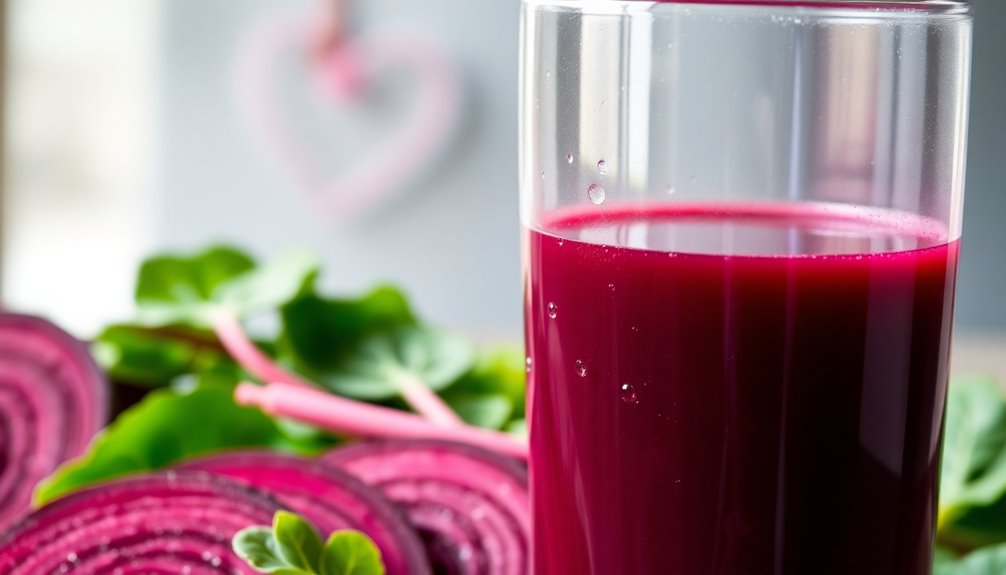
When you drink beet juice, your body converts its nitrates into nitric oxide, which helps widen your blood vessels and lower blood pressure.
This process not only supports heart health but can also boost your exercise endurance.
Regularly incorporating beet juice into your diet could be a simple yet powerful way to manage hypertension.
Nitrate Conversion Process
Beet juice serves as a powerful ally for heart health, thanks to its high nitrate content, which your body converts into nitric oxide. This nitrate conversion process happens rapidly, often within an hour of consuming beet juice. Nitric oxide helps widen your blood vessels, enhancing blood flow and lowering blood pressure. A 2022 meta-analysis highlighted that regular beet juice consumption considerably reduces systolic blood pressure in adults with hypertension. By increasing plasma nitrate levels, beet juice not only supports cardiovascular health but also improves exercise tolerance. Additionally, beet juice is rich in betalains, which have anti-inflammatory properties, further contributing to heart health.
Impact on Exercise Endurance
The benefits of beet juice extend beyond just heart health; it can also greatly boost your exercise endurance. By drinking beet juice regularly, you can improve blood flow and lower blood pressure, which is essential for enhancing your performance during workouts. Studies show that older adults with heart failure saw a 24% improvement in aerobic endurance after consuming just 70 mL of beet juice daily. Additionally, a protein-rich breakfast like an Egg Rollup and Dumpling Sauce can further support your fitness goals.
| Duration | Blood Pressure Effect | Exercise Improvement |
|---|---|---|
| 5-6 Days | Significant reduction | Enhanced stamina |
| Daily Intake | Clinically meaningful drop | 24% increase in endurance |
Incorporating beet juice into your routine not only supports heart health but also elevates your exercise game.
Exploring the Heart-Healthy Properties of Pomegranate Juice
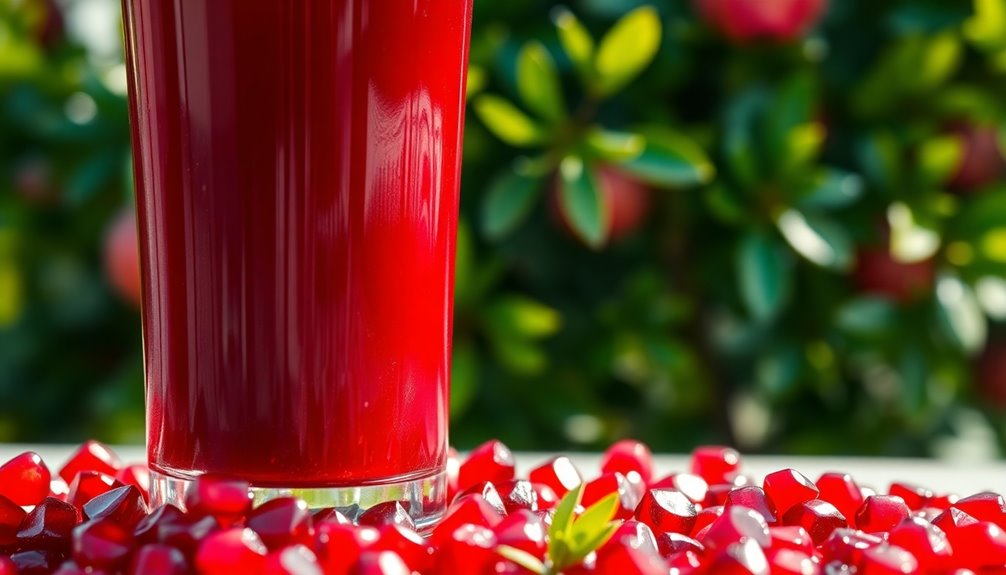
Pomegranate juice is a powerhouse of heart-healthy benefits that can elevate your cardiovascular wellness. Packed with unique antioxidants, it helps prevent the hardening and narrowing of arteries, promoting overall cardiovascular health.
Studies indicate that drinking pomegranate juice may lower blood pressure, making it especially beneficial for those with hypertension. Rich in polyphenols, this juice reduces inflammation and stimulates circulation, providing heart health benefits similar to red wine without the alcohol.
By regularly incorporating pomegranate juice into your balanced diet, you can improve blood flow, enhancing heart function and lowering your risk of heart disease. Additionally, its rich antioxidant content supports detoxification and reduces inflammation, further contributing to heart health.
The Impact of Coffee and Tea on Heart Function

When you enjoy coffee or tea, you're not just savoring a tasty beverage; you're also tapping into potential heart benefits.
Moderate caffeine intake from these drinks provides antioxidants that can help protect your heart.
Just remember, moderation is key to reaping these rewards without the jitters. Additionally, antioxidants found in beverages like coffee and tea may also support overall health, contributing positively to heart function.
Caffeine and Heart Health
While many people enjoy their morning coffee or afternoon tea, you might be surprised to learn that these beverages can actually benefit your heart health.
Drinking 3-5 cups of coffee daily is linked to a reduced risk of heart disease, stroke, and heart failure. Each additional cup can lower these risks by 5-8%. The heart health benefits come from caffeine, antioxidants, and anti-inflammatory properties.
If you prefer tea, its flavonoids help reduce inflammation and arterial buildup while providing moderate caffeine, making it suitable for those sensitive to it. Additionally, both beverages offer a variety of health benefits that can contribute to overall wellness.
Both drinks can be enjoyed hot or cold, offering versatile options for heart-healthy hydration. Just remember to limit added sugars and creamers to fully enjoy their health advantages.
Antioxidants in Beverages
Antioxidants play an essential role in promoting heart health, particularly through beverages like coffee and tea.
Drinking 3-5 cups of coffee daily can notably reduce your risk of heart disease, stroke, and heart failure, with each additional cup cutting these risks by 5-8%. The antioxidants and anti-inflammatory properties in coffee contribute to these health effects.
On the other hand, tea is packed with flavonoids that help reduce inflammation and arterial buildup, offering heart health benefits whether you enjoy it hot or cold. Herbal teas can also provide additional support for heart health by enhancing overall well-being.
To maximize these advantages, stick to unsweetened options without creamers. Even if you're caffeine-sensitive, tea's moderate caffeine content allows you to reap its heart-healthy rewards without the jitters.
Moderation Is Key
Moderation in your coffee and tea consumption can greatly influence heart function.
Drinking 3-5 cups of coffee daily can lower your risk of heart disease, stroke, and heart failure. Each additional cup may reduce these risks by 5-8%. The antioxidants and anti-inflammatory properties in coffee contribute to improved heart health, but too much caffeine can lead to jitters.
On the other hand, tea, rich in flavonoids, can also reduce inflammation and arterial buildup. Moderate tea consumption, containing about half the caffeine of coffee, is ideal for those sensitive to caffeine.
To maximize heart health benefits, enjoy your coffee and tea without high-calorie creamers and sugars. Remember, moderation is key for a healthy heart!
Nutritional Advantages of Tomato Juice for Heart Health
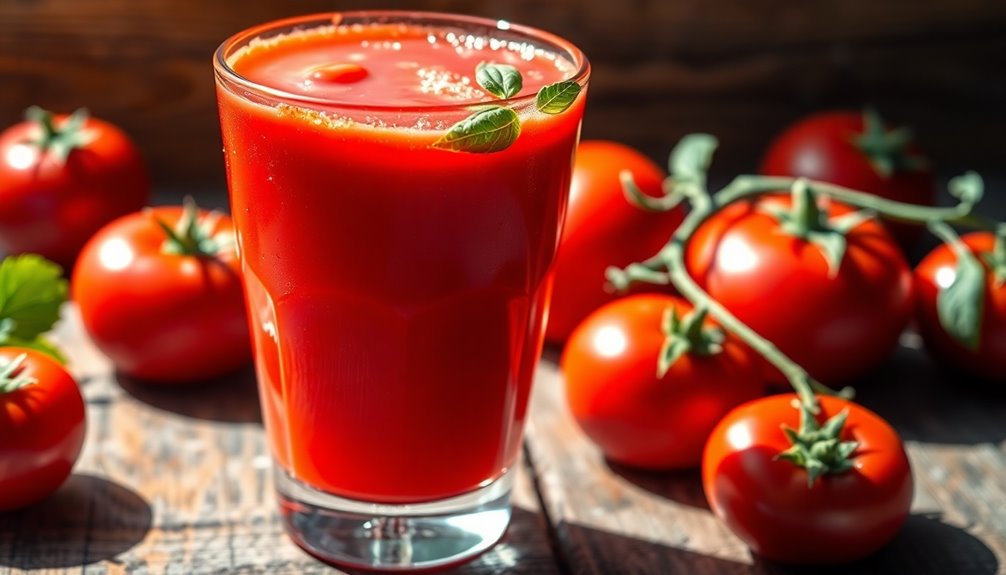
Tomato juice offers numerous nutritional advantages that can greatly boost your heart health. Rich in essential vitamins and minerals like vitamins C and E, iron, magnesium, and potassium, it promotes healthy blood flow. The high levels of lycopene, an antioxidant found in tomato juice, help strengthen arteries and reduce cholesterol levels, lowering your risk of heart disease. Additionally, consuming tomato juice can provide antioxidants that combat oxidative stress, further supporting overall cardiovascular health.
| Nutrient | Benefits | Sources |
|---|---|---|
| Vitamins C and E | Supports immune function | Tomato juice |
| Lycopene | Lowers LDL cholesterol | Juiced tomatoes |
| Iron | Aids in oxygen transport | Tomato juice |
| Magnesium | Regulates blood pressure | Tomato juice |
Choosing low-sodium and low-sugar options can further enhance these heart health benefits.
Green Juice: A Delicious Way to Increase Vegetable Intake
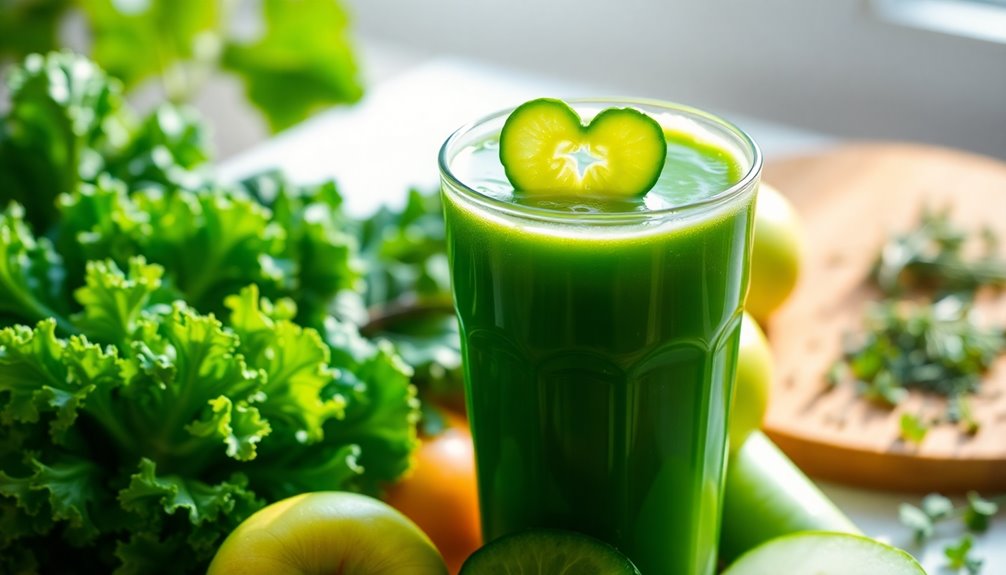
Green juice is a delicious way to increase your vegetable intake, especially if you're not a fan of eating them whole. Packed with heart-healthy ingredients like spinach and kale, this nutrient-rich beverage is high in calcium, iron, and flavonoids, which help reduce inflammation and support overall heart health.
By blending vegetables with a small amount of fruit, you'll enjoy a naturally sweet flavor while keeping sugar content lower than pure fruit juices. Regularly sipping green juice can help you meet your daily vegetable intake goals, promoting better health and wellness. Additionally, incorporating vegetable juices like celery can provide low-calorie options that are beneficial for heart health.
Just be mindful of the extra calories it adds to your diet!
Smoothies: Blending for Heart Health
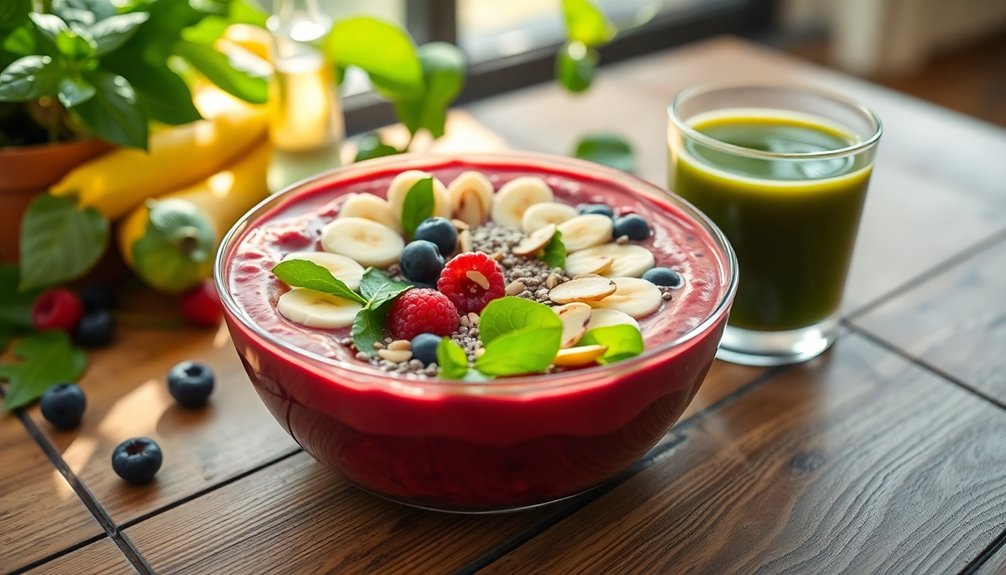
When you whip up a smoothie, the ingredients you choose can make all the difference for your heart health.
By balancing the sweetness of dark-skinned fruits with nutrient-rich greens and superfoods like chia seeds, you can create a delicious blend that boosts your omega-3 intake.
Just remember to keep it low in sugar to maximize those heart-healthy benefits!
Nutrient-Rich Ingredients Matter
Incorporating nutrient-rich ingredients into your smoothies can greatly boost heart health. Dark-skinned fruits like blueberries and pomegranates are packed with antioxidants, helping to combat free radicals and support your cardiovascular system.
Adding leafy greens such as spinach and kale provides essential nutrients, including calcium, iron, and omega-3 fatty acids, which are beneficial for heart health. Superfoods like chia seeds increase your omega-3 intake, linked to lower cholesterol levels and a reduced risk of heart disease.
The combination of fruits and vegetables enhances nutrient absorption, making your smoothies both nutritious and satisfying. By using low-sugar ingredients and avoiding excessive added sugars, you can manage calorie intake and prevent blood sugar spikes, further supporting your overall heart health.
Balancing Sweetness and Health
To create smoothies that truly benefit your heart, it is essential to strike a balance between sweetness and health. Opt for dark-skinned fruits like blueberries and pomegranates to add natural sweetness while boosting antioxidants. Incorporate nutritious ingredients like spinach and chia seeds for their heart health benefits.
Here's a simple guide to help you balance your smoothie:
| Fruit Juice | Nutritious Ingredients | Sweetness Level |
|---|---|---|
| Orange Juice | Spinach | Moderate |
| Apple Juice | Chia Seeds | High |
| Pomegranate Juice | Kale | Low |
| Berry Blend | Greek Yogurt | Moderate |
| Pineapple Juice | Avocado | High |
Boosting Omega-3 Intake
While you might think of smoothies as just a tasty treat, they can actually be a powerful tool for boosting your omega-3 intake. Incorporating omega-3-rich ingredients can enhance your heart health and reduce the risk of heart disease.
Here are some great additions for your smoothies:
- Chia seeds: Packed with omega-3s and fiber.
- Flaxseeds: Another excellent source of these essential fatty acids.
- Leafy greens: Spinach or kale adds nutrients and antioxidants.
Using vegetable juice or plant-based milks, like almond or soy, also enriches your smoothie.
Regularly blending these ingredients not only supports cardiovascular health but also delivers a delicious way to enjoy essential nutrients while promoting overall heart function.
The Importance of Hydration for Heart Wellness

Staying hydrated plays an essential role in maintaining your heart health, as proper hydration helps regulate blood volume and circulation.
When you're dehydrated, your heart has to work harder, leading to an increased heart rate and blood pressure, which puts extra strain on your cardiovascular system. This strain can potentially result in heart-related issues over time.
Drinking enough water regularly also supports your kidneys in filtering waste and toxins, promoting overall cardiovascular health.
Aim to drink enough water to maintain clear or light-colored urine, indicating good hydration levels.
While plain tap water is the healthiest option, flavored sparkling waters can provide a revitalizing alternative without added sugars.
Prioritize hydration to keep your heart healthy!
Moderation and Balance: Finding the Right Juice for You
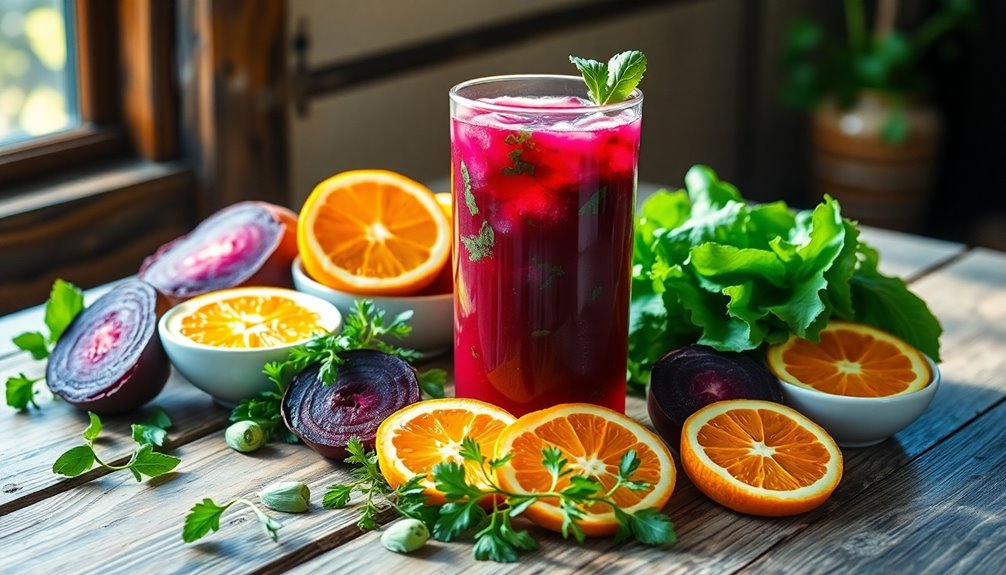
Finding the right juice for your heart health involves balancing enjoyment with nutritional benefits. While juices can boost your nutrient intake, moderation is essential. To maximize juice benefits for heart health, opt for options rich in antioxidants, such as beetroot or pomegranate juice, which have been linked to improved circulation and lower blood pressure. Additionally, consider mixing juices with leafy greens or fiber-rich fruits to enhance their nutritional profile while keeping sugar levels in check. Remember that whole fruits and vegetables are also valuable, so aim for a balanced approach by incorporating both juices and solid foods into your diet.
Here are some tips to help you choose wisely:
- Opt for vegetable juices to lower sugar intake while still enjoying health perks.
- Incorporate whole fruits and veggies to benefit from essential fiber for heart health.
- Choose a variety of juices from leafy greens and citrus fruits for a range of antioxidants and vitamins.
Frequently Asked Questions
What Is the Best Juice to Drink for Your Heart?
When you're looking for the best juice for your heart, consider beetroot juice. Its high nitrate content can lower blood pressure and improve circulation quickly.
Citrus juices, like orange and lemon, offer flavonoids that protect against heart disease.
Don't forget about pomegranate juice, packed with antioxidants that reduce inflammation.
Tomato juice is another great option, providing lycopene to strengthen arteries.
Choose any of these for a delicious heart health boost!
What Is the Number One Food for Your Heart?
Think of your heart as a finely tuned engine; it needs the right fuel to run smoothly.
When it comes to the number one food for your heart, consider beetroot. Its high nitrate content can notably lower blood pressure and enhance blood vessel function.
Alongside beetroot, incorporating leafy greens and omega-3-rich foods can create a powerhouse of nutrients that support cardiovascular health.
What Is the One Drink Cardiologists Want You to Sip for a Healthy Heart?
If you're looking for a drink that cardiologists recommend for heart health, beet juice is your go-to choice. Its high nitrate content helps lower blood pressure by widening blood vessels, making it effective within just an hour.
Plus, regular consumption can boost your exercise stamina and lower LDL cholesterol levels. With antioxidants that fight inflammation and a low-calorie count, beet juice fits perfectly into a heart-healthy diet.
What Is the Number One Supplement for Heart Health?
When it comes to the number one supplement for heart health, omega-3 fatty acids stand out.
You can find these in fish oil, and they've been shown to reduce triglycerides and lower the risk of arrhythmias.
By incorporating omega-3s into your routine, you could decrease your risk of heart disease by up to 30%, especially if you've got high cholesterol or triglyceride levels.
It's a simple step towards a healthier heart!
Conclusion
As you sip on a vibrant glass of juice, picture your heart dancing with joy, nourished by nature's bounty. Each antioxidant-rich drop works tirelessly, lowering blood pressure and boosting wellness. Remember, it's all about balance—mixing flavors and colors just like a painter's palette. So, embrace the delicious journey of juicing, hydrate your body, and let your heart thrive. With every invigorating sip, you're not just quenching your thirst; you're nurturing your heart, one tasty drink at a time.
Susannah expertise lies in researching and compiling evidence-based content on juicing, nutrition, and overall health. She is committed to ensuring that The Juicery World offers accurate, up-to-date, and trustworthy information to empower readers to take control of their health. Susannah’s goal is to inspire individuals to embrace juicing as a way to nourish their bodies and live their best lives.

